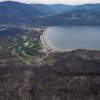David Chartrand, Vice-President of the Métis National Council, is urging the federal government to form an apology before the remaining Métis military veterans are no longer here to hear it.
In a letter to Lawrence MacAulay, the Veterans Affairs Minister, Chartrand insisted that an apology addressing the veterans who were “disrespected” and “ignored” must be carried out before the end of their lives, and "time is running out."
Chartrand says the Manitoba Métis community recently lost another Second World War veteran, who did not receive proper recognition and justice before his death.
“Upon their return from the war, they were met with disrespect, then ignored, and never to receive the economic benefits and reintegration supports that they were promised,” he wrote on Mar. 4.
“It is unfortunate there have been delays outside of our control. Yet, I cannot impress more upon you, your staff and your government how important this is to the Métis veterans.”
He also says the federal government and the Métis Nation were close to reaching an agreement under former Veterans Affairs Minister Seamus O’Regan.
O’Regan was moved out of the portfolio and into Indigenous Services during a January cabinet shuffle.
MacAulay’s office says it plans to speak with Chartrand and the Métis National Council in the near future on the issue concerning Métis military veterans.
“He remains committed to appropriately recognizing Métis veterans for their courage, achievements and sacrifices that they have made in defence of Canada,” the office said.
“We have been working closely with the Métis Nation and we will continue to work closely and expeditiously on the way forward in support of reconciliation.”
Last week, Trudeau delivered an apology in Iqaluit, Nunavut, to Inuit for handling of tuberculosis between the 1940s and 1960s.
Many Inuit were sent south for treatment during this period and some never returned home and were buried in southern Canada. Their families were never told of their deaths, nor their final resting places.
With files from The Canadian Press
















